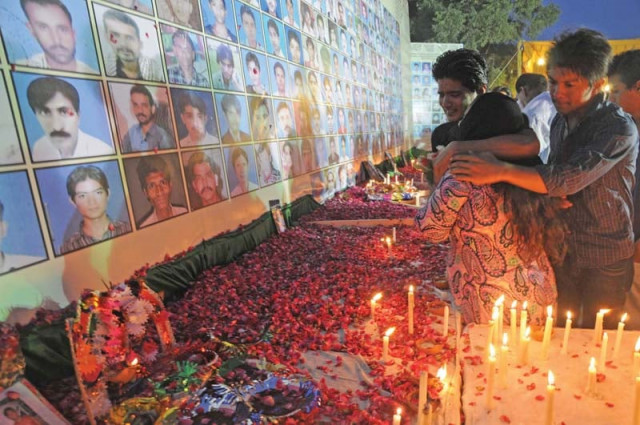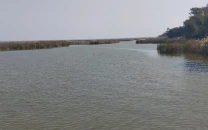Baldia factory fire: Victims’ families to pursue case against German buyer
There were around 210 people, all affected by the fire that engulfed Ali Enterprises in September 2012

Relatives of the Baldia factory fire victims hold a vigil in remembrance of their loved ones. PHOTO: FILE
"My son was off from work that day. He was called by someone to the factory to collect his salary," wailed a middle-aged woman, in heavily accented Urdu. "The caller asked him to come quickly, saying that on coming late, Rs500 would be deducted." He rushed to the factory but never come back, she told The Express Tribune.
"He was locked inside with hundreds of other workers. The factory management did not allow anyone to escape the fire. They fretted more for the inventory than saving precious lives," she complained. "We don't want compensation; we want to see them [owners, management and others] held accountable for this mass murder."
She burst into tears as she spoke more on the issue. Others, sitting beside her, tried to console her, wiping their own tears. There were around 210 people, all affected by the fire that engulfed Ali Enterprises in September 2012. On Sunday afternoon, they gathered at the PMA House auditorium for a general body meeting of their association, which is advocating a rights and compensation campaign for the slain workers.
"You guys are doing a remarkable job. The whole world salutes you for taking up this cause so that no one else would meet the same fate as your loved ones," reflected Carolijn Terwindt, a German rights activist.
At the general body meeting, organised by the National Trade Union Federation and the Ali Enterprises Fire Affectess Association, a German rights campaigner duo were invited. The duo, Terwidnt and her colleague, Miriam Saage-Maass, were part of a team that is pursuing a case against KiK, a German retailing giant that was buying products from Ali Enterprises, to get adequate compensation for the victims of the factory fire.
The case, with the consent of the victims and on their behalf, has been filed with the High Court of Dortmund and is fixed for an oral hearing next year. KiK, which according to the German duo, is infamous for poor working conditions, has been accused of not urging Ali Enterprises to ensure labour rights since it was the sole buying agent.

Similarly, a similar case is being prepared against RINA, an Italian business audit firm, which issued a clearance certificate to Ali Enterprises, despite its many shortcomings.
"The German court has taken cognisance of the case. The case is strong and there are chances that the buying agent will come back to the negotiation table," Saage-Maass, who herself is a lawyer, told the affectees, while briefing them on the case status.
The programme continued for three hours. During the concluding session, the organisers asked the attendees if they wanted the case to be pursued in foreign courts or wanted to quit. Everyone supported pursuing the case, raising their hands above as an affirmative signal.
"We will go till the very end. Our children are gone and can never come back. At least we can save others from the suffering that we have been through," said one of the members of the audience.
Regarding the case status in the Dortmund court, Saage-Maass told The Express Tribune that they were going to file another suit against KiK for trying to change the trajectory of the case. "KiK has used the testimony of a suspect [Rizwan Qureshi] to contend that the fire was an act of arson. So the responsibility does not lie on its shoulders."
The German activist said that she herself went through the whole document and found it be a mere story. "It is all based on hearsay. Nothing concrete in it." And even if it were, she added, the poor working conditions and non-availability of a safe exit could not be excused.
Published in The Express Tribune, October 26th, 2015.



















COMMENTS
Comments are moderated and generally will be posted if they are on-topic and not abusive.
For more information, please see our Comments FAQ